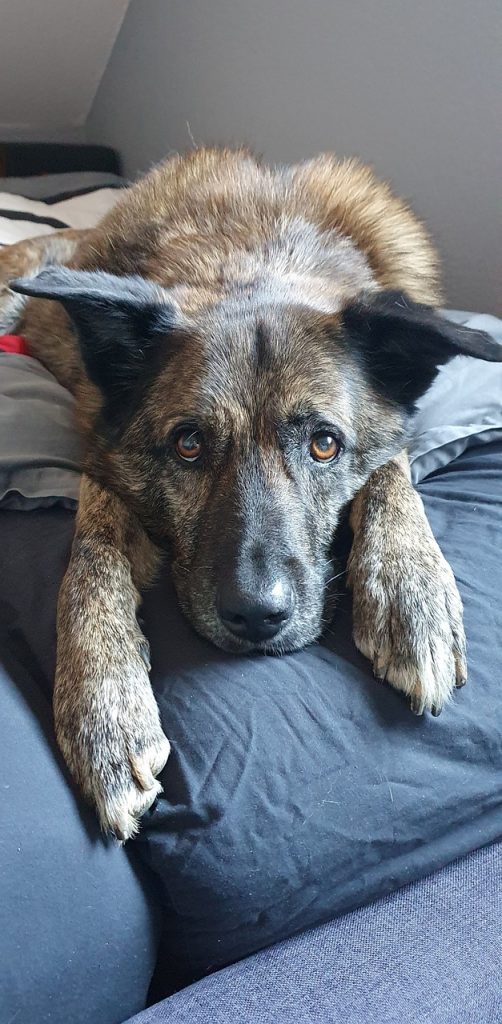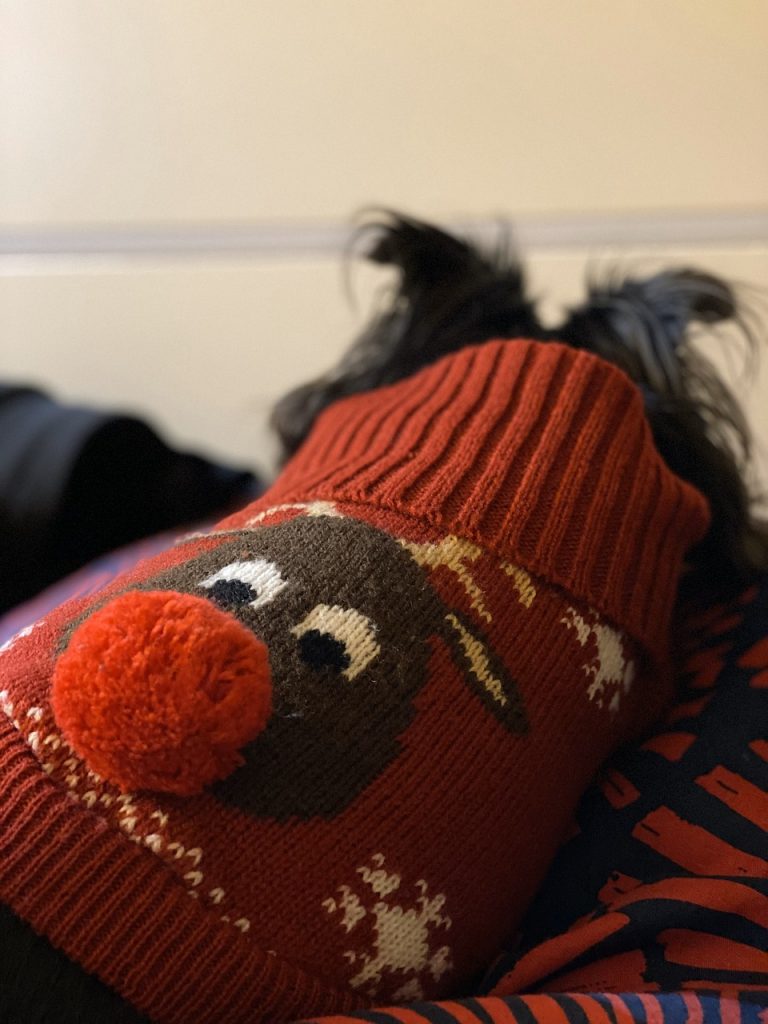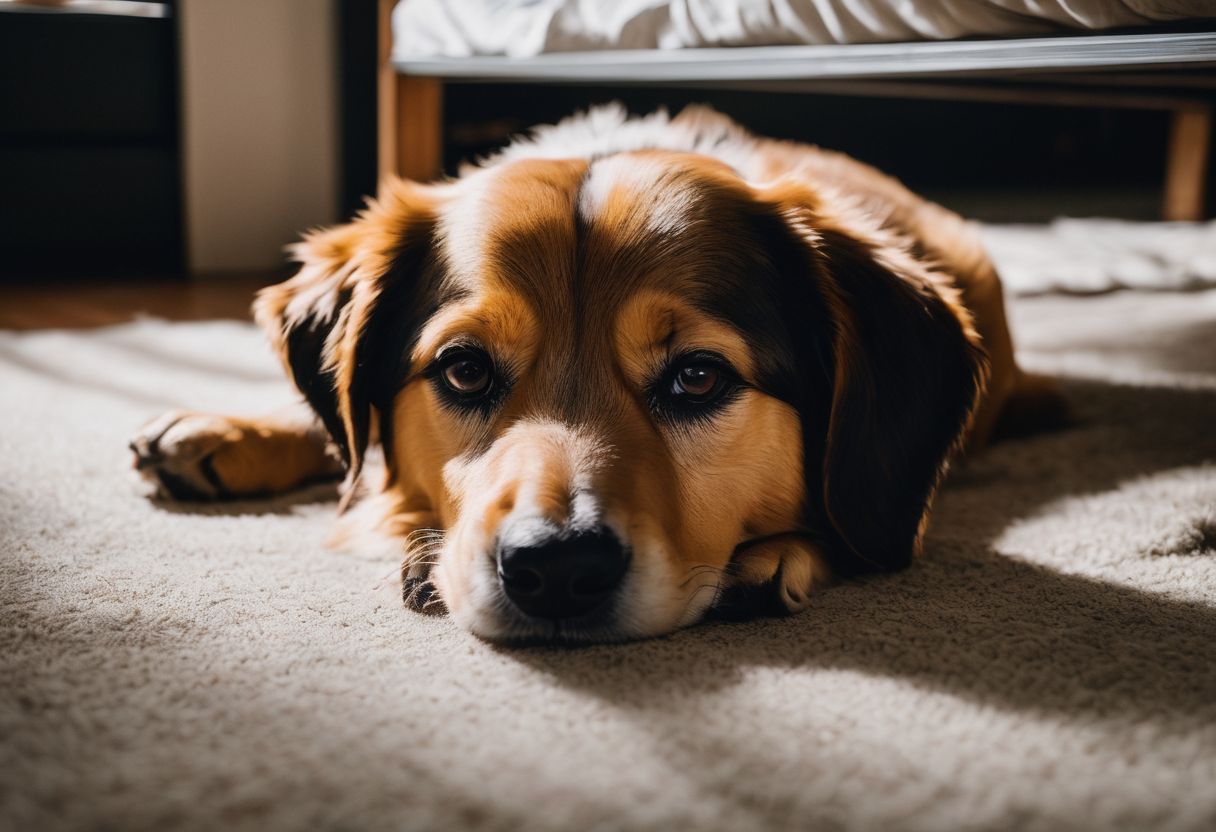Have you ever noticed your canine friend snuggling up under your bed for a snooze, leaving you perplexed? Here’s an interesting fact: it’s quite common among dogs to find unconventional hideaways like the space underneath beds comforting.
In this article, we will explore all the possible reasons behind this unique sleep habit and help decode what goes on in that furry head of theirs! Ready to unravel the secret? Let’s dive in.

Key Takeaways
- Dogs may sleep under the bed for various reasons, including seeking privacy, feeling safe and secure, hiding something or avoiding their owners, seeking comfort or relief from pain or illness, and trying to be close to their owners.
- If your dog consistently sleeps under the bed, it’s important to monitor changes in appetite and sleep patterns as well as signs of anxiety or fear.
- To encourage your dog to sleep elsewhere, provide a designated sleeping area or bed, create a safe and comfortable environment, address any underlying anxiety or stress, and use positive reinforcement.
Reasons Why Dogs Sleep Under the Bed
Dogs sleep under the bed for various reasons, including seeking privacy, feeling safe and secure, hiding something or avoiding their owners, seeking comfort or relief from pain or illness, and trying to be close to their owners.
Seeking privacy
Dogs love to have their own space too. Just like us, they sometimes seek a quiet place away from all the noise and bustle. The spot under your bed can be this perfect hideaway for them.
It’s cozy and private, making it a top choice when they need some alone time. This doesn’t mean they love you any less! They just need their own little cave to relax in once in a while.
Feeling safe and secure
Dogs often sleep under the bed because it makes them feel safe and secure. This behavior comes from their natural instinct to find a cozy and protected spot. Under the bed provides them with a den-like environment where they can relax without feeling exposed.
Dogs have an innate need for security, and sleeping under the bed fulfills that need. It’s important to understand that this behavior is usually nothing to worry about and simply shows that your dog feels comfortable in your home.
By allowing them to sleep under the bed, you are providing a space where they can feel safe and at ease.
Hiding something or avoiding you
Sometimes, dogs may sleep under your bed because they are hiding something or trying to avoid you. It might seem suspicious, but don’t worry too much. Dogs have a natural instinct to find safe and quiet spots to keep their treasures or hide when they feel guilty about something.
So, if you notice your dog sleeping under the bed with their favorite toy or treat, they might just be keeping it safe from other pets or even from you! They’re not being sneaky on purpose; it’s just part of their animal behavior.
It’s best to let them have their hiding spot and respect their need for privacy.
Seeking comfort or relief from pain or illness
Dogs may choose to sleep under your bed because they are seeking comfort or relief from pain or illness. Just like humans, dogs can experience discomfort and may seek out a cozy spot where they feel safe and secure.
Sleeping under the bed provides them with a sense of protection and can help alleviate any physical discomfort they may be feeling. It’s important to pay attention to any changes in their behavior or signs of illness, such as decreased appetite or unusual sleep patterns, as this could indicate that something is wrong.
If you notice these signs, it’s best to consult with your veterinarian to ensure your furry friend gets the proper care and treatment they need.
Trying to be close to you
One possible reason why your dog sleeps under the bed is because they are trying to be close to you. Dogs have a strong instinct to seek out their owners for comfort and companionship.
By sleeping under the bed, they may feel closer to you and find a sense of security. It’s their way of showing their love and loyalty. So, don’t be surprised if you find your furry friend curled up under the bed seeking your presence during bedtime or when they need reassurance.

When to Be Concerned About Your Dog Sleeping Under the Bed
Watch out for changes in your dog’s appetite and sleep patterns, as well as signs of anxiety or fear, which could indicate underlying issues that need to be addressed.
Changes in appetite and sleep patterns
If your dog starts sleeping under the bed, it’s important to pay attention to any changes in their appetite and sleep patterns. This could be a sign that something is not quite right. Keep an eye out for the following:
- Loss of appetite or a sudden decrease in food intake
- Difficulty falling asleep or frequent waking during the night
- Excessive tiredness or lethargy throughout the day
- Changes in sleeping position, such as restless tossing and turning
- Increased snoring or heavy breathing while sleeping
Signs of anxiety or fear
Dogs can show signs of anxiety or fear when they sleep under the bed. Here are some things to look out for:
- Whining or whimpering during sleep.
- Trembling or shaking while under the bed.
- Excessive panting or heavy breathing.
- Pacing or restlessness before bedtime.
- Avoiding eye contact and cowering when approached.
- Excessive drooling or licking of lips while underneath the bed.
- Dilated pupils and tense body language.
- Increased aggression or growling when disturbed under the bed.
- Urinating or defecating inappropriately while hiding under the bed.
Signs of illness or injury
If your dog is consistently sleeping under your bed, it’s important to consider if they might be experiencing any signs of illness or injury. Here are some things to look out for:
- Decreased appetite: If your dog suddenly loses interest in food or experiences a significant decrease in their appetite, it could be a sign that something is wrong.
- Changes in sleep patterns: If your dog is sleeping more than usual or having trouble sleeping through the night, it could indicate pain or discomfort.
- Limping or difficulty moving: Notice if your dog is favoring one leg, limping, or having trouble getting up and down. These could be signs of injury.
- Excessive licking or chewing: Pay attention if your dog is constantly licking or chewing at a specific area of their body. It could indicate a wound or irritation.
- Behavioral changes: If your normally energetic and playful dog becomes lethargic, withdrawn, or unusually aggressive, it may signal an underlying health issue.
- Abnormal bowel movements: Keep an eye on any changes in your dog’s bowel movements such as diarrhea, constipation, blood in the stool, or accidents in the house.

How to Encourage Your Dog to Sleep Elsewhere
Encourage your dog to sleep elsewhere by providing a designated sleeping area or bed, creating a safe and comfortable environment, addressing any underlying anxiety or stress, and using positive reinforcement and rewards.
Providing a designated sleeping area or bed
To encourage your dog to sleep elsewhere, you can try the following:
- Set up a cozy and comfortable bed specifically for your dog.
- Choose a location that is quiet and away from any disturbances.
- Make sure the bed is the right size for your dog, providing enough space to stretch out comfortably.
- Add soft blankets or pillows to make it extra inviting.
- Place the bed in an area where your dog feels safe and secure, such as a corner of the room.
- Consider using a crate or an enclosed space if your dog prefers that type of sleeping arrangement.
- Make sure the designated sleeping area is clean and free from any odors or irritants.
- Establish a bedtime routine by consistently leading your dog to their designated sleeping spot at night.
- Use positive reinforcement by praising and rewarding your dog when they choose to sleep in their designated area.
Creating a safe and comfortable environment
To help encourage your dog to sleep elsewhere, you can create a safe and comfortable environment. Here are some tips:
- Provide a designated sleeping area or bed for your dog. Having their own space can make them feel secure and give them a sense of ownership.
- Make sure the sleeping area is warm, cozy, and quiet. Avoid placing it near noisy appliances or in high-traffic areas where there may be disturbances.
- Use soft bedding that is easy to clean. Your dog will appreciate having a comfortable place to rest their head.
- Consider using calming aids such as lavender scents or calming music to help relax your dog before bedtime.
- Keep the sleeping area free from any hazards or objects that could potentially harm your dog. This includes keeping small toys, cords, and other choking hazards out of reach.
- Ensure that the sleeping area is in a location where your dog feels safe and secure. This could be in a corner of the room or next to a familiar object, like their favorite toy.
Addressing any underlying anxiety or stress
If your dog sleeps under the bed, it could be a sign that they are feeling anxious or stressed. Here are some ways you can address these underlying issues:
- Create a calm environment: Make sure your dog’s sleeping area is quiet and free from any potential triggers that may cause stress or anxiety.
- Provide mental and physical stimulation: Engage your dog in regular playtime, exercise, and activities that keep their mind occupied. This can help reduce their stress levels and provide them with an outlet for their energy.
- Establish a routine: Dogs thrive on structure and routine, so try to establish a consistent daily schedule for feeding, exercise, and sleep. This can help reduce their anxiety by providing predictability in their day-to-day life.
- Use positive reinforcement: Reward your dog for calm behavior and provide praise when they choose to sleep in their designated area instead of under the bed. This will help them associate positive experiences with sleeping elsewhere.
- Consider professional help: If your dog’s anxiety or stress levels are severe or persist despite your efforts, it may be helpful to consult with a veterinarian or animal behaviorist who can provide guidance and additional support.
Using positive reinforcement and rewards
To encourage your dog to sleep elsewhere, you can try using positive reinforcement and rewards. Here are some tips:
- Create a designated sleeping area or bed for your dog and make it comfortable and inviting.
- Use treats or praise when your dog chooses to sleep in their designated area instead of under the bed.
- Provide toys or interactive puzzles in their sleeping area to keep them entertained and engaged.
- Establish a consistent bedtime routine that includes going to their sleeping spot and rewarding them for staying there.
- Avoid scolding or punishing your dog for sleeping under the bed, as this may cause anxiety or fear.
- Gradually reduce access to under the bed by using gates or barriers if necessary, while still providing a cozy alternative space.
- Offer extra attention, cuddles, or playtime with your dog during waking hours to ensure they feel loved and secure.

Conclusion
In conclusion, understanding why dogs sleep under the bed can help us better understand their behavior and needs. Whether they’re seeking privacy, feeling safe, or trying to be close to us, it’s important for dog owners to create a comfortable and secure environment for their furry companions.
If your dog consistently sleeps under the bed, it may also be worth considering any underlying stress or health issues that could be contributing to this behavior. By providing love, care, and attention, we can ensure our dogs have a peaceful and restful place to sleep.
FAQs
1. Why does my dog sleep under my bed?
Your dog might sleep under your bed for comfort, companionship, or due to canine behavior based on animal instincts.
2. Can sleeping under the bed be a sign of stress in dogs?
Yes, dogs may hide under the bed as a reaction to stress from thunderstorm anxiety or other stressful events.
3. Should I be worried if my dog sleeps under furniture often?
Dogs hiding under the bed can point to health issues or injury. If this is new behavior for your pet, it’s smart to see a vet.
4. Does sleeping in an owner’s room strengthen emotional bonds with dogs?
Yes! Dogs sleeping in their owner’s rooms show they seek close ties and shared experiences with their owners.
5. What are other reasons why dogs prefer sleeping under the bed?
Besides seeking comfort, dogs might also use such spaces when faced with decreased appetite or some illness symptoms that make them feel safe there.
6. How can you help if your dog always hides and sleeps under the bed?
If you notice any change like your dog now prefers staying alone and its behavior is unlike before; please seek advice from an expert who knows about animal psychology and pet care well.


